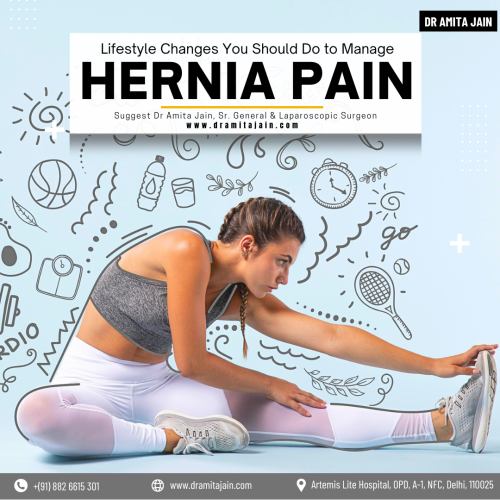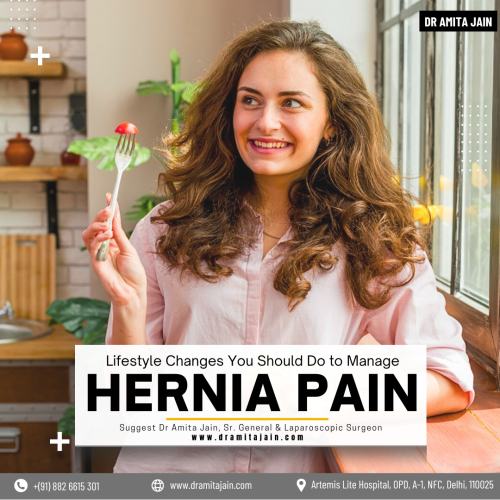Hernia pain can be exhausting, especially when surgery is not immediately possible. However, certain lifestyle changes can help you manage symptoms, prevent flare-ups, and improve day-to-day comfort. Here’s what you can do, as explained by Dr Amita Jain, a leading general and laparoscopic surgeon and one of the best hernia surgeons in Delhi and India.
What do you need to manage your hernia pain?
Watch What You Eat
Your diet plays a major role in managing hernia pain, particularly if you have a hiatal hernia. Eating large, heavy meals can increase pressure on your abdomen and worsen the pain. Instead, opt for smaller, more frequent meals throughout the day.
Try to avoid spicy, greasy, and acidic foods such as citrus, tomatoes, caffeine, and chocolate, which can trigger acid reflux. Also, including fibre-rich foods like fruits, vegetables, and whole grains helps prevent constipation, which often puts added strain on the abdominal wall.

Maintain a Healthy Weight
Excess weight increases pressure on the abdominal muscles and can aggravate hernia symptoms. If you’re overweight, losing weight gradually through a balanced diet and light physical activity can ease this pressure. Avoid crash diets or extreme fasting, as they can lead to muscle weakness and further health issues. A healthy weight also reduces the chances of developing new hernias or worsening existing ones.
Avoid Heavy Lifting and Straining
Lifting heavy objects or straining during exercise or bowel movements can cause the hernia to bulge more, leading to increased pain. Try to avoid such activities, especially those that put direct stress on the abdominal area. If lifting is unavoidable, use proper posture by bending your knees and keeping the load close to your body. Also, avoid exercises like crunches or planks unless your doctor approves them.
Wear Comfortable Clothing
Tight-fitting clothes, especially around the waist or abdomen, can put pressure on the hernia and make symptoms worse. Choose loose, breathable clothing that allows your body to relax. Avoid belts or tight waistbands that dig into your stomach area, especially after meals or during bloating.
Practice Better Posture
Posture has a bigger impact on hernia pain than you might expect. Sitting upright during and after meals can reduce acid reflux symptoms if you have a hiatal hernia. Throughout the day, avoid slouching or hunching over, as poor posture can increase abdominal tension and discomfort. Use a supportive chair and make it a habit to stand or walk after eating.
Quit Smoking
Smoking slows down tissue repair and affects muscle strength, making hernias worse over time. It also increases the risk of chronic coughing, which adds pressure to the abdomen. Quitting smoking not only improves hernia symptoms but also boosts your overall health and recovery if surgery is ever required.

Dr Amita Jain is one of India’s most distinguished and experienced senior surgeons who has conducted more than 1,00,000 successful surgeries, and has covered a wide spectrum of general and minimally invasive procedures. Dr Amita Jain is refered as the pioneer surgeon in the fields of Gallbladder stone removal surgery, appendix removal surgery, hernia repair surgery, Pilonidal Sinus treatments, varicose vein and piles surgery, fistula surgery and fissure surgeries.
With an outstanding career spanning over 29 years, Dr Amita Jain has earned her place among the top General and Laparoscopic surgeons in Delhi and India, known for her precision, compassion, and consistent surgical excellence. She was the Professor of Surgery at the Army College of Medical Sciences and Base Hospital, Delhi Cantt. In 1994, she was commissioned as a surgeon under the United Nations Mission in Congo.
Dr Amita Jain currently serves as the Head of Department and Senior Consultant for General, Laparoscopic and Trauma Surgery at Artemis Lite Hospital, Rosewalk – Luxury Maternity Hospital in Delhi (Panchsheel Park, Delhi) and Rainbow Children Hospitals (Malviya Nagar, Delhi).

